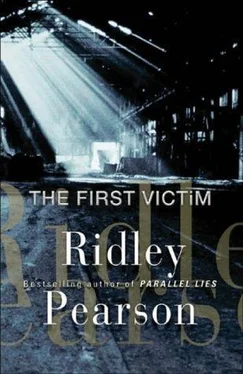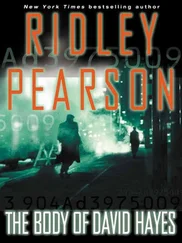Ridley Pearson - The First Victim
Здесь есть возможность читать онлайн «Ridley Pearson - The First Victim» весь текст электронной книги совершенно бесплатно (целиком полную версию без сокращений). В некоторых случаях можно слушать аудио, скачать через торрент в формате fb2 и присутствует краткое содержание. Жанр: Триллер, на английском языке. Описание произведения, (предисловие) а так же отзывы посетителей доступны на портале библиотеки ЛибКат.
- Название:The First Victim
- Автор:
- Жанр:
- Год:неизвестен
- ISBN:нет данных
- Рейтинг книги:3 / 5. Голосов: 1
-
Избранное:Добавить в избранное
- Отзывы:
-
Ваша оценка:
- 60
- 1
- 2
- 3
- 4
- 5
The First Victim: краткое содержание, описание и аннотация
Предлагаем к чтению аннотацию, описание, краткое содержание или предисловие (зависит от того, что написал сам автор книги «The First Victim»). Если вы не нашли необходимую информацию о книге — напишите в комментариях, мы постараемся отыскать её.
The First Victim — читать онлайн бесплатно полную книгу (весь текст) целиком
Ниже представлен текст книги, разбитый по страницам. Система сохранения места последней прочитанной страницы, позволяет с удобством читать онлайн бесплатно книгу «The First Victim», без необходимости каждый раз заново искать на чём Вы остановились. Поставьте закладку, и сможете в любой момент перейти на страницу, на которой закончили чтение.
Интервал:
Закладка:
Melissa Chow hadn’t been seen in ten days. This was the only clock running in his head.
‘‘No, it shouldn’t,’’ Boldt agreed, forcing a moment of paralysis onto her otherwise expressionless face.
He checked his watch. Instead of seeing the minute or hour hand again, he saw the date. Ten days. The rule book would say she was dead. Boldt had the video-he believed otherwise. With the sweatshop now a matter of record, he had evidence to follow. He glanced at the aviation magazines, his head reeling.
LaMoia, who continued to keep McNeal under surveillance despite the risks, would keep Gaynes on researching polarfleece imports and manufacture; others would canvas discount houses, retail outlets, and street vendors, supplying Lofgrin and the lab with samples of every blue polarfleece garment available in King County. They needed a list of every vacant structure in the county, from canneries to former schools to airplane hangars. They needed that sweatshop. The work seemed endless. Suddenly the idea of babysitting a Fortune 500 corporation and spying on its employees lost its shine. Even sitting there waiting for the vice president of human resources to get off the phone seemed a futile act.
He glanced up at a black-and-white photo on the wall and saw three grave mounds, only to realize it was in fact the gray curving roofs of airplane hangars, not freshly dug graves. But the image served to remind him of the digital tape and Melissa’s mention of ‘‘the graveyard.’’ Were there other women buried at Hilltop Cemetery? Had they missed that?
He grabbed the phone and dialed his own pager number. Ten seconds after he hung up, the pager sounded loudly. Glancing at it, he stood and took hold of his old ratty briefcase. ‘‘Something’s come up,’’ he informed the secretary. ‘‘I’ve got to get back to the office.’’
‘‘He’ll be done with the call any minute,’’ she pleaded. Boldt sensed it was her job to hold him, her problem to fix.
‘‘It’s urgent.’’
The woman nodded, seemingly relieved. Official police business would let her off the hook. ‘‘May I reschedule?’’
‘‘I’ll call.’’
‘‘We can do it now. I’ve got his Day-Timer right here.’’ She flipped some pages.
‘‘Mine’s back at the office,’’ he said.
‘‘He’ll be terribly disappointed to have missed you.’’ She glanced toward the phone, clearly hoping to see the phone’s line light extinguished. She resolved to stall him. No one would walk out on conversation. ‘‘There’s a good buzz about you.’’
‘‘A buzz?’’ he said. ‘‘I’m glad.’’ He cringed. He didn’t want to be the topic of buzzing.
Her index finger with its half-inch plastic nail roamed the man’s schedule. ‘‘How’s your golf game?’’
Boldt returned a puzzled look and glanced down at the coffee table magazines. He had tried the game in another life, back when Liz had been whole and the kids only an idea discussed at the end of lovemaking.
‘‘They need a fourth on Friday,’’ she said. Keeping her voice low she informed him, ‘‘All the big deals are done out there. I imagine you’ll be seeing quite a bit of the golf course.’’
‘‘A bit rusty,’’ he said. The closest he had come in recent years was mini-golf with Miles.
‘‘I can pencil you in.’’
‘‘I don’t think so, no. I really had better check my schedule.’’ He broke with etiquette and headed for the doors.
‘‘You’ll call?’’ she fired off somewhat desperately.
He winced. He wouldn’t call. Not for some time. First he would run things by Liz in order to include her in the decision. She planned to return to full-time work by Thanksgiving. She would interpret this job change of his as a stubborn refusal to see her as healed, as his way of financially protecting his future.
His days of running the family alone, running things without her, were over. They had been over for several months, though he was loath to accept it. In a strange way he had become dependent on her illness, had adjusted his life to meet it head on, had focused on nothing but that for the last sixteen months, had learned well the role of single father, orphaned husband and head of household, had become dependent on her dependence on him. Her return to the family was difficult to take; his decisions were challenged again; his monarchy once more a democracy.
At the elevators, he caught a glimpse of himself in a wall mirror. Mama Lu’s offer of a better suit teased him. More than a bad fit, its mood was wrong. LaMoia was right: He only wore a suit at funerals and award dinners.
If he returned for the job interview he was wearing khakis and a blazer. But he wasn’t coming back, not any time soon. He knew Liz’s vote before ever hearing it. He wondered if he could get used to that kind of participation again, and if not, what he was supposed to do about it.
CHAPTER 37
Boldt arrived alone at Hilltop Cemetery, struck immediately by the finality of death. Melissa had mentioned ‘‘the graveyard’’ on the digital tape. It was time to review that evidence. Hence the visit.
As a homicide cop he was surrounded by death, but not quite like this, the granite and marble headstones rising out of the lush green lawn, names rubbed illegible by decades of salt air so that the stones were nothing more than anonymous testimonies to death itself. The solitude overwhelmed him. He expected either LaMoia or Daphne to join him, having left voice mail for both, and he hoped it might be sooner than later. Visiting a graveyard seemed too close to home; he couldn’t get Liz’s illness out of his thoughts, and suddenly grief and fear overcame him. He stepped forward and leaned his weight against someone named Lillian Grace Rogers who had been in residence in that spongy earth some seventy-three years.
‘‘Do you believe in God?’’ It was Daphne standing incredibly close, just behind him. He’d called her and asked her to meet him. He thought he had found the missing link, but would need support within the department. He didn’t turn around because of his tears. But Daphne always seemed able to read his mind.
‘‘Yes. Of course,’’ he answered.
‘‘Do you have faith in God?’’ she asked.
‘‘Maybe not,’’ he admitted. ‘‘Not after twenty years in this job.’’
A light rain, a mist, began falling. Boldt pulled himself off Lillian Grace Rogers and stood erect.
‘‘Liz has faith in God,’’ Daphne said. ‘‘A deep penetrating trust. A reliance. I’m not qualifying that. It’s foreign to me, too. But until you understand the difference between your belief and her faith-
until you bridge that gap-you can’t possibly hope to understand her.’’
‘‘I have to understand her,’’ he said into the light rain.
‘‘Yes, you do.’’
‘‘So it’s incumbent on me to do this?’’ She didn’t answer. ‘‘You think?’’
‘‘She’s not the one struggling, Lou.’’
A jet passed overhead, its lights flashing, its turbines grinding. The air seemed to shake. Boldt hoped it was the air and not him.
Daphne asked, ‘‘What’s with the suit?’’
‘‘I interviewed with Boeing,’’ he said. To him it felt like a confession; Daphne, of all people, should have heard ahead of time. ‘‘Actually, I didn’t. But I was scheduled to.’’
‘‘I see.’’ She added, ‘‘Whose idea?’’
‘‘Liz doesn’t know.’’
‘‘Okay.’’
‘‘You think I’m running. From work, or from Liz?’’
‘‘I didn’t say anything.’’
‘‘I don’t understand her spirituality. Her reliance upon it. Okay?’’
‘‘But you’ve tried,’’ she said questioningly.
Читать дальшеИнтервал:
Закладка:
Похожие книги на «The First Victim»
Представляем Вашему вниманию похожие книги на «The First Victim» списком для выбора. Мы отобрали схожую по названию и смыслу литературу в надежде предоставить читателям больше вариантов отыскать новые, интересные, ещё непрочитанные произведения.
Обсуждение, отзывы о книге «The First Victim» и просто собственные мнения читателей. Оставьте ваши комментарии, напишите, что Вы думаете о произведении, его смысле или главных героях. Укажите что конкретно понравилось, а что нет, и почему Вы так считаете.












